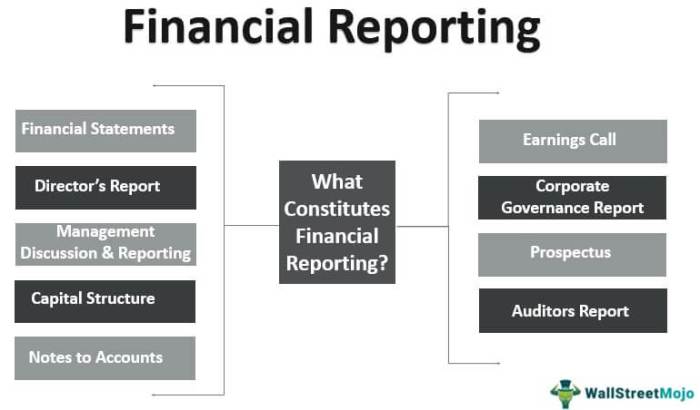The Role of Big Four Accounting Firms in Global Financial Governance is a complex and multifaceted subject. These four giants—Deloitte, Ernst & Young, KPMG, and PwC—exert significant influence on the global financial landscape, shaping accounting standards, auditing practices, and corporate governance worldwide. Their reach extends far beyond national borders, impacting financial stability and economic development on a global scale. This exploration delves into their profound impact, examining both the benefits and potential drawbacks of their concentrated power.
Their involvement in setting International Financial Reporting Standards (IFRS), conducting audits of multinational corporations, and providing consulting services creates a powerful dynamic. This influence necessitates a careful examination of potential conflicts of interest, regulatory oversight mechanisms, and the overall impact on global financial markets. We will explore their contributions to corporate transparency and accountability, while also considering criticisms regarding market concentration and the potential for regulatory capture.
Influence on International Accounting Standards

The Big Four accounting firms—Deloitte, Ernst & Young (EY), KPMG, and PricewaterhouseCoopers (PwC)—exert significant influence on the development, interpretation, and application of International Financial Reporting Standards (IFRS) globally. Their extensive involvement stems from their role as auditors, consultants, and advisors to multinational corporations, influencing the standards’ creation and practical implementation. This influence, while often beneficial in promoting consistency and high-quality reporting, also raises concerns about potential conflicts of interest and the dominance of a few powerful players in shaping global accounting practices.
The Big Four’s role in the development and adoption of IFRS is multifaceted. They actively participate in the International Accounting Standards Board (IASB)’s standard-setting process, contributing expertise and influencing the direction of IFRS development through their participation in advisory groups, consultations, and direct lobbying. Their global reach allows them to gather feedback from a diverse range of clients and jurisdictions, shaping the standards to reflect practical implementation challenges and diverse business contexts. Furthermore, their significant resources enable them to dedicate substantial personnel and expertise to influencing the standards-setting process, ensuring their perspectives are prominently considered.
IFRS Interpretation and Application
The Big Four firms play a crucial role in the interpretation and application of IFRS globally. Their expertise is widely sought after by companies seeking guidance on complex accounting issues. They produce numerous publications, training materials, and software solutions to aid in IFRS implementation, thereby shaping how companies understand and apply the standards. Their interpretations and recommendations, disseminated through their vast networks, effectively influence the practical application of IFRS across various industries and jurisdictions. This influence extends to advising companies on how to manage the risks associated with IFRS compliance, further shaping how companies approach accounting practices. The scale of their advisory services ensures that their interpretations become de facto standards in many cases.
Comparative Approaches to IFRS Implementation
While all Big Four firms offer similar services regarding IFRS, subtle differences exist in their approaches across different jurisdictions. These variations often reflect the specific regulatory environments, the concentration of their client base in particular sectors, and their internal strategic priorities. For instance, in jurisdictions with stricter regulatory oversight, a firm might adopt a more conservative approach, emphasizing meticulous compliance. In other regions with more flexible regulations, they may offer more innovative and flexible solutions. Differences in the depth of local expertise and network of contacts also lead to varied implementation strategies. These variations, while not always significant, highlight the nuanced ways the firms adapt their services to the specific contexts in which they operate.
IFRS Compliance Consulting Services
| Firm | Advisory Services | Training & Development | Technology Solutions |
|---|---|---|---|
| Deloitte | IFRS implementation support, accounting policy advice, IFRS convergence assistance | Workshops, webinars, online courses | Software for IFRS compliance, data analytics tools |
| Ernst & Young (EY) | IFRS gap analysis, transaction advisory services, regulatory compliance advice | Customized training programs, certification courses | Integrated IFRS reporting platforms |
| KPMG | IFRS consulting, due diligence services, IFRS training for management | In-house and external training programs | Automation tools for IFRS reporting |
| PricewaterhouseCoopers (PwC) | IFRS implementation support, accounting policy design, IFRS transition services | Workshops, seminars, e-learning modules | Software solutions for IFRS reporting and analysis |
Auditing Practices and Global Financial Stability
The Big Four accounting firms – Deloitte, Ernst & Young (EY), KPMG, and PricewaterhouseCoopers (PwC) – play a pivotal role in ensuring the reliability of financial reporting globally. Their audits provide a crucial layer of assurance to investors, creditors, and other stakeholders, influencing trust in financial markets and contributing to global financial stability. However, their immense size and influence also raise concerns about potential conflicts of interest and the effectiveness of regulatory oversight.
The impact of Big Four audits on the reliability of financial reporting worldwide is substantial. Their audits are considered a cornerstone of investor confidence, allowing capital to flow more freely and efficiently across international borders. A robust and credible audit process, ideally performed by independent and highly competent firms, is fundamental to a functioning global financial system. Conversely, failures in auditing practices can lead to significant financial losses, erosion of investor confidence, and even systemic crises.
Conflicts of Interest in Auditing and Consulting Services
The Big Four firms not only provide auditing services but also a wide range of consulting services to the same companies they audit. This dual role creates a significant potential for conflicts of interest. For example, a consulting engagement might incentivize the firm to issue a more favorable audit opinion to maintain a lucrative consulting relationship. This potential conflict undermines the independence and objectivity crucial for reliable audits, potentially compromising the integrity of financial reporting. Regulations aim to mitigate this through measures like increased transparency and stricter separation of auditing and consulting arms within the firms, but the inherent tension remains.
Regulatory Mechanisms Overseeing Big Four Auditing Practices
Various regulatory bodies at national and international levels oversee the auditing practices of the Big Four. These include national accounting oversight boards (e.g., the Public Company Accounting Oversight Board (PCAOB) in the United States), as well as international organizations like the International Federation of Accountants (IFAC). These bodies set auditing standards, conduct inspections of audit firms, and investigate allegations of misconduct. However, the effectiveness of these regulatory mechanisms has been questioned, particularly in the wake of significant audit failures. The sheer size and global reach of the Big Four firms present a significant challenge to effective regulation and enforcement.
Examples of Significant Audit Failures and Their Consequences
Several high-profile audit failures involving Big Four firms have highlighted the potential risks associated with their dominant market position. The collapse of Enron in 2001, audited by Arthur Andersen (since dissolved), exposed significant weaknesses in auditing practices and led to increased scrutiny of the industry. Similarly, the financial crisis of 2008 revealed systemic failures in the auditing of complex financial instruments, with some attributing a contributing role to the Big Four’s audits of major financial institutions. These failures resulted in substantial financial losses, investor distrust, and regulatory reforms aimed at improving audit quality and independence. The consequences often extend beyond immediate financial losses to include reputational damage for the firms involved, stricter regulatory oversight, and increased public skepticism towards corporate financial reporting.
Role in Corporate Governance and Transparency: The Role Of Big Four Accounting Firms In Global Financial Governance
The Big Four accounting firms—Deloitte, Ernst & Young (EY), KPMG, and PricewaterhouseCoopers (PwC)—play a significant role in shaping global corporate governance and transparency. Their influence stems from their extensive auditing practices, advisory services, and the sheer volume of publicly traded companies they serve. This pervasive presence gives them considerable leverage in promoting better corporate governance and accountability.
The Big Four’s contribution to improved corporate governance practices globally is multifaceted. They provide a range of services, from designing internal control systems and advising on corporate strategy to conducting independent audits of financial statements. These services are crucial in ensuring that companies adhere to best practices, comply with relevant regulations, and maintain transparency in their operations. Their global reach enables them to implement consistent standards across diverse jurisdictions, fostering a more unified approach to corporate governance.
Methods Used to Promote Transparency and Accountability
Big Four firms employ several methods to enhance transparency and accountability in corporate reporting. These include rigorous auditing procedures designed to detect and prevent financial misstatements, the provision of assurance services on non-financial information such as environmental, social, and governance (ESG) data, and advising on the implementation of robust internal controls. Furthermore, their extensive experience allows them to identify potential risks and vulnerabilities within a company’s structure, enabling proactive measures to mitigate these risks. They also actively participate in the development and dissemination of accounting standards, ensuring these standards remain relevant and effective in promoting transparency.
Effectiveness in Preventing Corporate Fraud and Financial Misconduct
The effectiveness of the Big Four in preventing corporate fraud and financial misconduct is a subject of ongoing debate. While they play a crucial role in detecting and reporting fraudulent activities through their audits, instances of significant corporate failures audited by Big Four firms highlight the limitations of their oversight. Factors contributing to this include the inherent limitations of audit procedures, the potential for auditor capture (where auditors become overly reliant on the client for future business), and the complexity of modern financial instruments and transactions. However, it’s important to note that the detection of fraud is not solely the responsibility of auditors; strong internal controls and a robust regulatory environment are also essential components of a robust anti-fraud framework. Furthermore, post-fraud investigations often reveal failures in internal controls and corporate governance, rather than solely deficiencies in the audit process.
Hypothetical Scenario: Impact of Weak Corporate Governance
Imagine a multinational corporation, “GlobalTech,” operating in multiple countries, with significant revenue streams from various technological products. GlobalTech, audited by PwC, exhibits weak corporate governance. Internal controls are inadequate, risk assessment is superficial, and the board of directors lacks independent oversight. This leads to aggressive accounting practices, unreported liabilities, and potentially fraudulent transactions. While PwC conducts its audit according to professional standards, the limitations of the audit process, coupled with the weak internal controls, allow material misstatements to go undetected for an extended period. Eventually, the fraudulent activities are uncovered, leading to a significant stock price decline, legal action, and substantial reputational damage for both GlobalTech and PwC, potentially affecting PwC’s reputation and future business. This hypothetical scenario illustrates how even with external auditing from a Big Four firm, weak corporate governance can lead to catastrophic consequences.
Impact on Developing Economies

The Big Four accounting firms – Deloitte, Ernst & Young (EY), KPMG, and PricewaterhouseCoopers (PwC) – play a significant, albeit complex, role in the financial development of developing economies. Their influence extends beyond the provision of traditional auditing services, impacting corporate governance, regulatory frameworks, and ultimately, economic stability. However, the nature and extent of this influence differ considerably from their role in established markets, raising important ethical and practical considerations.
The involvement of Big Four firms in developing economies presents a nuanced picture. While their presence offers potential benefits, such as improved financial reporting and increased investor confidence, challenges related to regulatory capacity, infrastructure limitations, and ethical considerations are significant. A comparative analysis reveals contrasting operational landscapes and impacts between developed and developing nations.
Role Comparison: Developed vs. Developing Economies
In developed economies, the Big Four operate within well-established regulatory frameworks and benefit from robust institutional structures. They often act as advisors to large multinational corporations, contributing to the sophistication of financial markets. Their influence is significant in shaping accounting standards and best practices. In contrast, developing economies often lack the same level of regulatory oversight and infrastructural support. The Big Four’s role here is more often focused on capacity building, assisting local firms in meeting international standards, and supporting the development of more transparent and accountable business practices. This often means navigating complex political and economic landscapes, adapting their services to local contexts, and working with governments and regulatory bodies to improve the overall financial ecosystem. The scale and scope of their operations differ dramatically, reflecting the varying levels of market maturity and regulatory sophistication.
Challenges in Providing Services in Developing Countries
Big Four firms face numerous challenges in providing auditing and consulting services in developing countries. These include: limited access to skilled personnel, inadequate infrastructure (including technology and communication networks), political instability and corruption, weak regulatory frameworks and enforcement, and cultural differences that can complicate business operations and relationships. Furthermore, the lack of standardized accounting practices and a prevalence of informal economies can significantly increase the complexity of audits and consulting engagements. The risk of fraud and financial irregularities is often higher in these environments, demanding greater due diligence and specialized expertise from the firms. Difficulties in enforcing contracts and protecting intellectual property rights also present considerable challenges. For example, securing reliable data for audits can be difficult due to poor record-keeping practices or the prevalence of cash-based transactions.
Potential Benefits and Drawbacks of Big Four Involvement
The involvement of the Big Four in developing economies presents both significant benefits and potential drawbacks. Benefits include improved corporate governance, enhanced financial reporting standards, increased investor confidence leading to greater foreign direct investment (FDI), and the development of local accounting expertise through training and knowledge transfer. However, potential drawbacks include the dominance of a few powerful firms potentially stifling competition, concerns about the transfer of inappropriate practices from developed markets, the potential for conflicts of interest due to the provision of both auditing and consulting services to the same client, and the risk of exacerbating existing inequalities within the financial system by primarily serving larger corporations. For instance, a disproportionate focus on large multinational corporations might neglect the needs of smaller businesses and hinder their growth.
Ethical Considerations for Big Four Firms Operating in Developing Countries
The ethical responsibilities of Big Four firms operating in developing countries are particularly crucial. The unique challenges and complexities of these environments demand a heightened commitment to ethical conduct.
- Maintaining independence and objectivity in audits, especially when dealing with government-linked entities or companies with significant political influence.
- Ensuring fair compensation and working conditions for local staff, avoiding exploitation of lower labor costs.
- Promoting transparency and accountability in all operations, including robust internal controls and conflict-of-interest management.
- Respecting local laws and customs while adhering to international ethical standards.
- Contributing to capacity building and development of local accounting expertise, rather than simply extracting value from the market.
- Actively combating corruption and promoting ethical business practices within the local environment.
- Addressing potential conflicts of interest arising from providing both auditing and consulting services to the same client, ensuring independence in audit work is maintained.
Competition and Market Concentration
The global auditing market is significantly concentrated, with the Big Four firms—Deloitte, Ernst & Young (EY), KPMG, and PricewaterhouseCoopers (PwC)—holding an overwhelming majority of the market share. This dominance raises crucial questions regarding competition, the quality of auditing services, and the overall stability of the global financial system. This section will analyze the competitive landscape, the inherent risks of such concentrated power, and the resulting impact on pricing and quality of audit services. We will also briefly examine alternative auditing firms and their comparatively limited market presence.
The Big Four’s dominance is a result of several factors, including their global reach, established reputations, sophisticated technological capabilities, and extensive client networks. This concentration of power, however, creates a potential conflict of interest, as these firms often provide a wide range of services to the same clients, including auditing, consulting, and tax advice. This interconnectedness can blur the lines of objectivity and independence, potentially compromising the integrity of the audit process.
Risks Associated with High Market Concentration, The Role of Big Four Accounting Firms in Global Financial Governance
High market concentration in the auditing industry presents several significant risks. The lack of robust competition can lead to reduced audit quality, higher prices for clients, and a decreased incentive for innovation. Furthermore, the size and influence of the Big Four firms raise concerns about regulatory capture, where regulators may be unduly influenced by the firms they are meant to oversee. This can result in weaker regulatory oversight and a greater likelihood of accounting scandals and financial instability. A significant risk stems from the potential for conflicts of interest arising from the Big Four’s provision of multiple services to the same client. The potential for compromised objectivity in auditing due to pressure to retain lucrative consulting contracts, for example, is a considerable concern.
Impact of Market Concentration on Pricing and Quality of Auditing Services
The oligopolistic nature of the auditing market significantly impacts both pricing and quality. While the Big Four firms possess the resources to invest in advanced technologies and highly skilled professionals, their dominant position allows them to exert considerable influence on pricing, potentially leading to higher audit fees for clients. The lack of competitive pressure can also negatively affect the quality of auditing services, as firms may be less incentivized to invest in rigorous quality control mechanisms or to challenge clients’ accounting practices aggressively. This reduced competitive pressure can also stifle innovation within the industry. Clients, especially smaller companies, might face difficulties in accessing affordable and high-quality auditing services due to the market’s dominance by a few large players.
Alternative Auditing Firms and Market Share
While the Big Four dominate the global auditing market, numerous smaller, independent auditing firms exist. However, their combined market share is significantly smaller than that of the Big Four. These smaller firms often focus on niche markets or specific industries, catering to clients who may prefer a more personalized and less conflicted approach. They may also offer more competitive pricing compared to the Big Four, although their global reach and resources are typically more limited. The lack of scale and resources, compared to the Big Four, presents challenges to these smaller firms in terms of attracting and retaining talent, investing in technology, and competing for large clients. Examples of such firms vary considerably by region and specialization, making a global comparison of their market share challenging, and reliable data on their precise collective market share is difficult to obtain.
Regulatory Scrutiny and Reform
The Big Four accounting firms – Deloitte, Ernst & Young (EY), KPMG, and PricewaterhouseCoopers (PwC) – wield significant influence over global financial markets. Their size and reach inevitably attract intense regulatory scrutiny, driven by concerns about conflicts of interest, potential lack of independence, and the systemic risk their failures could pose. This scrutiny has led to a wave of regulatory reforms aimed at enhancing oversight and mitigating these risks.
The rationale behind the ongoing regulatory scrutiny stems from several key factors. The sheer concentration of power within these four firms raises concerns about potential monopolies and reduced competition. Furthermore, their involvement in both auditing and consulting services for the same clients creates a potential conflict of interest, jeopardizing the objectivity of audits. High-profile accounting scandals, such as Enron and WorldCom, further fueled calls for stricter regulation, highlighting the devastating consequences of audit failures. Finally, the interconnectedness of the global financial system means that the failure of a major audit firm could trigger a cascade of negative consequences, impacting global financial stability.
Regulatory Reforms Addressing Concerns
Numerous regulatory reforms have been implemented globally to address concerns about the Big Four’s influence. These reforms generally focus on enhancing audit quality, increasing independence, promoting competition, and improving transparency. Key initiatives include stricter independence rules prohibiting certain consulting services for audit clients, mandatory audit firm rotation, increased regulatory oversight of audit firms, and greater transparency requirements regarding audit methodologies and fees. The implementation and effectiveness of these reforms vary significantly across jurisdictions.
Comparative Regulatory Approaches
Different countries have adopted diverse approaches to overseeing the Big Four. Some jurisdictions, such as the United States, have implemented relatively stringent regulations, including mandatory audit firm rotation for publicly listed companies and increased penalties for audit failures. Others, like certain European Union member states, have focused on enhancing cooperation between national regulators and promoting a more harmonized regulatory framework across the bloc. Developing economies often face challenges in implementing robust regulatory frameworks due to limited resources and capacity. The variation in regulatory approaches reflects differing priorities, institutional capabilities, and political landscapes.
Timeline of Major Regulatory Changes (Since 2008)
| Year | Region/Country | Key Regulatory Change | Impact on Big Four |
|---|---|---|---|
| 2008 | Global | Increased scrutiny following the global financial crisis | Heightened pressure to improve audit quality and transparency |
| 2010 | EU | Implementation of the Audit Regulation | Increased regulatory oversight and requirements for auditor independence |
| 2012 | US | Dodd-Frank Act provisions on auditor independence | Restrictions on certain non-audit services provided to audit clients |
| 2018 | UK | Introduction of mandatory audit firm rotation for large listed companies | Increased competition and potential for market disruption |
Outcome Summary
In conclusion, the Big Four accounting firms play a pivotal role in shaping global financial governance. While their expertise and reach contribute significantly to financial stability and corporate transparency, concerns regarding market concentration, potential conflicts of interest, and the need for robust regulatory oversight remain crucial considerations. A balanced approach, fostering both competition and accountability, is essential to ensure the continued integrity and effectiveness of global financial systems. Further research and ongoing regulatory adaptation are vital to navigating the complexities of this dynamic landscape and mitigating potential risks.
Common Queries
What are the main criticisms leveled against the Big Four?
Criticisms often center on concerns about market concentration, potential conflicts of interest arising from their provision of both auditing and consulting services, and the perceived lack of sufficient regulatory oversight.
How do the Big Four firms impact developing economies?
Their involvement can bring expertise and improved accounting standards, but also raises concerns about affordability, cultural sensitivity, and the potential for exploitation.
Are there any alternative auditing firms to the Big Four?
Yes, numerous smaller and niche auditing firms exist, though they hold significantly smaller market share compared to the Big Four.
What role does technology play in the Big Four’s operations?
Technology is increasingly integral to their operations, impacting areas such as data analytics for auditing, automation of tasks, and the delivery of consulting services.
Discover the crucial elements that make Freelancer Accounting Guide the top choice.









